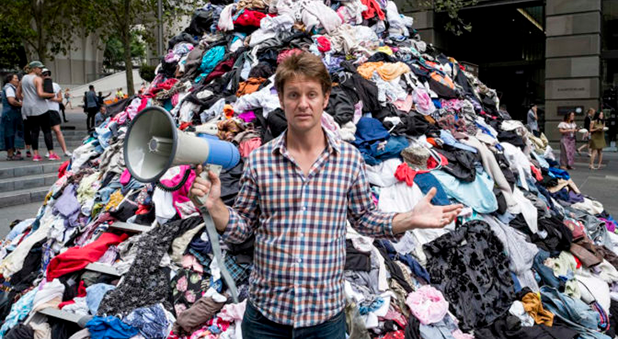Australia, we have a problem with waste. Craig Reucassel is back again, investigating our relationship with the environment in another three part series on the ABC. His mission to get us to reduce our waste began last year, where he exposed what’s in our bins, how much damage plastic bags and coffee cups are doing, and why our overconsumption of fast fashion needs to stop.
Since last season, there have been big changes. Supermarkets have listened, banning single-use plastic bags and adjusting their standards for fruit and vegetables. More of us are looking for ways to reduce what we send to landfill. This year, eyes are set on other rubbish, including single-use plastics and fast furniture.
With extravagant displays, he hopes to shake us out of our complacency. Craig stands on a mountain of clothes in the centre of Martin Place, representing the amount Aussies discard every ten minutes. A tonne of single use plastic is sculpted into the shape of a foot on Manly Beach, demonstrating the amount that ends up in landfill every minute. And he’s calling us, every day Aussies, to become soldiers in this war by making small and simple changes that can lead to big results. What if everybody used a keep-cup instead of a single-use coffee cup? What if we refused to buy bottled water, and instead refilled reusable bottles with water from the tap? What if we said no to plastic straws and furnished our homes with recycled and well made pieces? Craig says that if we all pitch in, we can make a difference.
And what’s not to love about this message?
Lionel Windsor believes that this is a message we can get on board with as Christians, provided that we understand it’s just one area of our theology. The New Testament lecturer at Moore College has just authored a book on God and the environment, titled ‘Is God Green?’, which will be released in November. He says that while it is good to care for the environment, we must take on this message with caution.
“We need to be careful not to naively take on this simple narrative. The narrative is that if humans are shown the right thing, then they will do it. If we show them, they will stop being ignorant. This doesn’t take into account human sin.”
Mr Windsor wouldn’t say his family are perfect examples, but they do what they can for the environment, including regularly recycling, composti, and being conscious of how much electricity they use at home. But he doesn’t think we should do these things to try and save the world. “Our world is already saved, Jesus is the one who has saved the world and will save the world. Our cause should be the gospel, and that gospel will reshape everything and it should reshape the way we respond to God’s world and the environment and our neighbours. We have a responsibility to do what is right out of love of our neighbour, not out of saving the world.”
War on Waste is a great show that raises important topics and campaigns for change, giving us the tools we need to start taking action and loving our neighbour. But while saving the environment is a good thing, it shouldn’t be our ultimate goal. Our priorities are shaped by the gospel of Jesus. A war on waste won’t save the world. Only Jesus can do that.
The three part documentary series aired on ABC television on Tuesday nights, and is still available to stream on ABC iView.



























